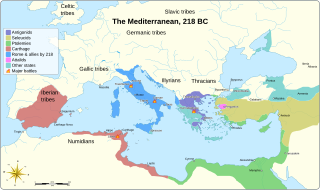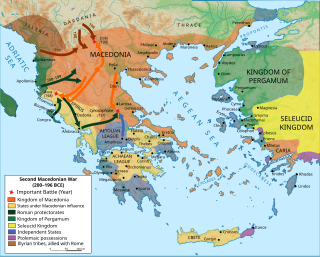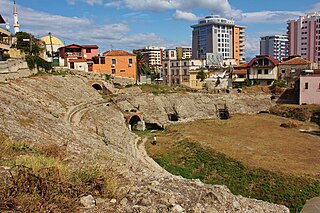Nicaea, Nicea, Nikaea or Nikaia (Greek: [place] of victory) may refer to:
Year 205 BC was a year of the pre-Julian Roman calendar. At the time it was known as the Year of the Consulship of Scipio and Dives. The denomination 205 BC for this year has been used since the early medieval period, when the Anno Domini calendar era became the prevalent method in Europe for naming years.

Nicaea, Nicæa or Nicea, also known as Nikaia, was an ancient Greek city in the north-western Anatolian region of Bithynia that is primarily known as the site of the First and Second Councils of Nicaea, the Nicene Creed, and as the capital city of the Empire of Nicaea following the Fourth Crusade in 1204, until the recapture of Constantinople by the Byzantines in 1261. Nicaea was also the capital of the Ottomans from 1331 to 1335.

Philip V was king (Basileus) of Macedonia from 221 to 179 BC. Philip's reign was principally marked by the Social War in Greece and a struggle with the emerging power of the Roman Republic. He would lead Macedon against Rome in the First and Second Macedonian Wars, losing the latter but allying with Rome in the Roman-Seleucid War against Antiochus III of the Seleucids. He died in 179 BC from illness after efforts to recover the military and economic condition of Macedonia and passed the throne onto his elder son, Perseus of Macedon.

Locris was a region of ancient Greece, the homeland of the Locrians, made up of three distinct districts.

The First Macedonian War was fought by Rome, allied with the Aetolian League and Attalus I of Pergamon, against Philip V of Macedon, contemporaneously with the Second Punic War against Carthage. There were no decisive engagements, and the war ended in a stalemate.

The Second Macedonian War was fought between Macedon, led by Philip V of Macedon, and Rome, allied with Pergamon and Rhodes. Philip was defeated and was forced to abandon all possessions in southern Greece, Thrace and Asia Minor. During their intervention, although the Romans declared the "freedom of the Greeks" against the rule from the Macedonian kingdom, the war marked a significant stage in increasing Roman intervention in the affairs of the eastern Mediterranean, which would eventually lead to Rome's conquest of the entire region.
Heraclea, Heracleia, Herakleia, or Heraclia may refer to:

The ancient Greek city of Epidamnos or Epidamnus, later the Roman Dyrrachium (Δυρράχιον), was founded in 627 BC in Illyria by a group of colonists from Corinth and Corcyra in cooperation with the local Illyrian Taulantii. Aristotle's Politics several times draws for examples on the internal government of Epidamnos, which was run as a tight oligarchy that appointed a ruling magistrate; tradesmen and craftsmen were excluded from power, until internal strife produced a more democratic government. The exiled oligarchs appealed to Corcyra while the democrats enlisted the help of Corinth, initiating a struggle between the two mother cities described by Thucydides as a cause of the Peloponnesian War. Individual trading with the local Illyrians was forbidden at Epidamnos: all traffic was through the authorized city agent or poletes. In the fourth century BC the city-state was part of the kingdoms of Cassander and Pyrrhus. The general vicinity of Epidamnus was called Epidamnia.
Magnesia ad Sipylum was a city of Lydia, situated about 65 km northeast of Smyrna on the river Hermus at the foot of Mount Sipylus. The city should not be confused with its older neighbor, Magnesia on the Maeander, both founded by colonists from the Greek region of Magnesia.
Larissa is the capital and largest city of Thessaly, Greece

Amfissa is a town in Phocis, Greece, part of the municipality of Delphi, of which it is the seat and a municipal unit. The municipal unit has an area of 315.174 km2. It lies on the northern edge of the olive forest of the Crissaean plain, between two mountains, Giona to the west and Parnassus to the east, 200 km (120 mi) northwest of Athens and 20 km (12 mi) of Delphi, as well as 85 km (53 mi) northeast of Naupactus and 72 km (45 mi) south of Lamia.
Nicaea was a Greek Macedonian noblewoman and was a daughter of the powerful regent Antipater. Her mother's name is unknown. She was born and raised in Macedonia while her father was governor of Macedonia during the reign of Greek King Alexander the Great.
Oenoe, also written Oinoi or Oene, may refer to:

Byllis or Bullis or Boullis (Βουλλίς) was an ancient city and the chief settlement of the Illyrian tribe of the Bylliones, traditionally located in southern Illyria. In Hellenistic times the city was either part of Illyria or Epirus. In Roman times it was included within Epirus Nova, in the province of Macedonia. The remains of Byllis are situated north-east of Vlorë, 25 kilometers from the sea in Hekal, Fier County, Albania. Byllis was designated as an archaeological park on 7 April 2003 by the government of Albania.
Damastion was an ancient city in the area of central Balkans, known for its silver coins dating back to the 4th century BC. It is attested only in Strabo who says that the city had silver-mines and locates it in Illyria. The ancient author reports that the city was under the authority of the Illyrian tribes of Dyestes and Enchelei-Sesarethii, and that Aegina colonized it. At 356–358 B.C. the mines came under the control of Macedon.
Nicaea, was the spouse of Alexander of Corinth, and ruler of Corinth after his death. She was married to the future king Demetrius II of Macedon.

The Balkan campaign ofAlexander the Great took place in 335 BC, against a number of rebellious vassals of the Macedonian kingdom. Alexander successfully pacified each in turn, leaving him free to begin the long-planned invasion of Persia.

Under the reign of Philip II, the ancient Greek kingdom of Macedonia, initially at the periphery of classical Greek affairs, came to dominate Ancient Greece in the span of just 25 years, largely thanks to the personality and policies of its king. In addition to utilising effective diplomacy and marriage alliances to achieve his political aims, Philip II was responsible for reforming the ancient Macedonian army into an effective fighting force. The Macedonian phalanx became the hallmark of the Macedonian army during his reign and the subsequent Hellenistic period. His army and engineers also made extensive use of siege engines.

The kingdom of Macedonia was an ancient state in what is now the Macedonian region of northern Greece, founded in the mid-7th century BC during the period of Archaic Greece and lasting until the mid-2nd century BC. Led first by the Argead dynasty of kings, Macedonia became a vassal state of the Achaemenid Empire of ancient Persia during the reigns of Amyntas I of Macedon and his son Alexander I of Macedon. The period of Achaemenid Macedonia came to an end in roughly 479 BC with the ultimate Greek victory against the second Persian invasion of Greece led by Xerxes I and the withdrawal of Persian forces from the European mainland.